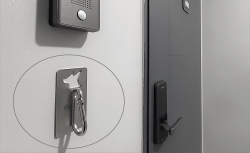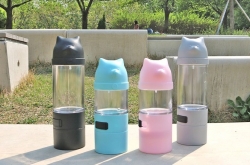As the number of Korean households owning pets has risen, there has been a change in people’s perception towards owning them. Pets are no longer viewed as a possession but rather considered as a companion and even a family member. This naturally led to the advent of pet-related markets.
According to the Korea Rural Economic Institute, the size of the pet market has reached over three trillion won in 2020. A new term called ‘petconomy’ was coined by compounding the words ‘pet’ and ‘economy’ to indicate the expanding pet market.
In today’s petconomy, a variety of unique products and services for pets such as taxis, kindergartens, and funeral services have been trending. These all show how people are striving to promote a pet-friendly culture and to develop a society where people and pets can coexist.

The recently built public rental housing in Seodaemun-gu, ‘Gyeonuilga,’ reflects the change in the meaning of animals in people’s lives. An animal housing expert conducted the entire process from designing to selecting materials and arranging the space. A community center is located on the first floor and a rooftop will be designed as a place for the companion animals to rest. In the entrance, there are bathtubs for them to use after taking a walk.
“We came up with this idea with the desire to provide a safe environment to raise companion animals,” said Kim, an official of Seodaemun-gu. “The housing would help those having difficulty in finding a place to live while at the same time ensuring high quality facilities to raise the animals. These days, as there is increased demand for various kinds of housing conditions, we are doing our best to provide better service for them.”
People who live in Seoul and are aged between 19 to 37 can apply for the rental house. They should not have a house of their own and earn less than 70 percent of the average monthly income of an urban worker. The district is in the process of deciding on the qualification of the companion animals.
“Because people will be raising animals in the house, the most important rule is to prevent conflict between the neighbors, so we are getting help from an expert to set the regulations,” Kim added.
Seodaemun-gu has been putting effort in providing housing for the youth. The second share house that they built is being praised as one of the most successful cases of enhancing youth housing welfare. Currently, they are planning on building startup housing as well.
“We are closely monitoring the residents of the previous rental houses in order to figure out what types of houses are needed,” Kim added. “We will continue to help provide rental houses by collaborating with the Seoul Housing & Communities Corporation as much as we can.”
Along with districts like Seodaemungu, there are also university startup teams contributing to the vitalization of petconomy as well. Ewha Voice interviewed Lee Sung-ho, the CEO of PETODAY and a graduate of Konkuk University. Lee decided on the company’s name, PETODAY, hoping for people and their pets to spend a great day every day.
When asked about the background behind entering the petconomy, Lee replied that his motive came from seeing veterinary students taking their dogs for a walk at the lake of Konkuk University.
“I witnessed students having difficulty giving water to their pets by using their hands while crouching or providing narrow-mouthed paper cups,” Lee said. “That is how I came up with the thought of a tumbler which could help owners easily provide water to their pets and also help pets drink water conveniently.”
After numerous tests, PETODAY released its own tumbler called ‘‘Daengbler’’ in 2020. ‘‘Daengbler’’ is a compound word consisting of daengdaengi, a slang of the word ‘‘puppy’’ in English, and ‘‘tumbler.’’

The product gained attention and won several awards in startup competitions including the Konkuk University Startup Competition for its multifunction. Lee explained that dogs defecate every time they go for a walk and that there are many times waste bags are prone to become soggy or teary. In order to solve this inconvenience, he came up with the idea of inserting containers inside the tumbler so that it can hold not only water but also waste bags and snacks.
“Having to pack water, paper cups, waste bags, and snacks might have been cumbersome,” Lee said. “However, people can solve those issues all at once by preparing one ‘‘Daengbler.’’ It is our vision to make comfortable products for both owners and dogs. In addition, we continue to do social contribution activities such as protecting abandoned dogs.”
Lee shared his hopes that the growing pet-related markets and industries would lead to a friendlier environment for all. In order for petconomy to develop for the better, he believes that it is important for petrelated teams including PETODAY to meet with pet owners, hear their experiences and discomfort, devise a solution, and take action.

